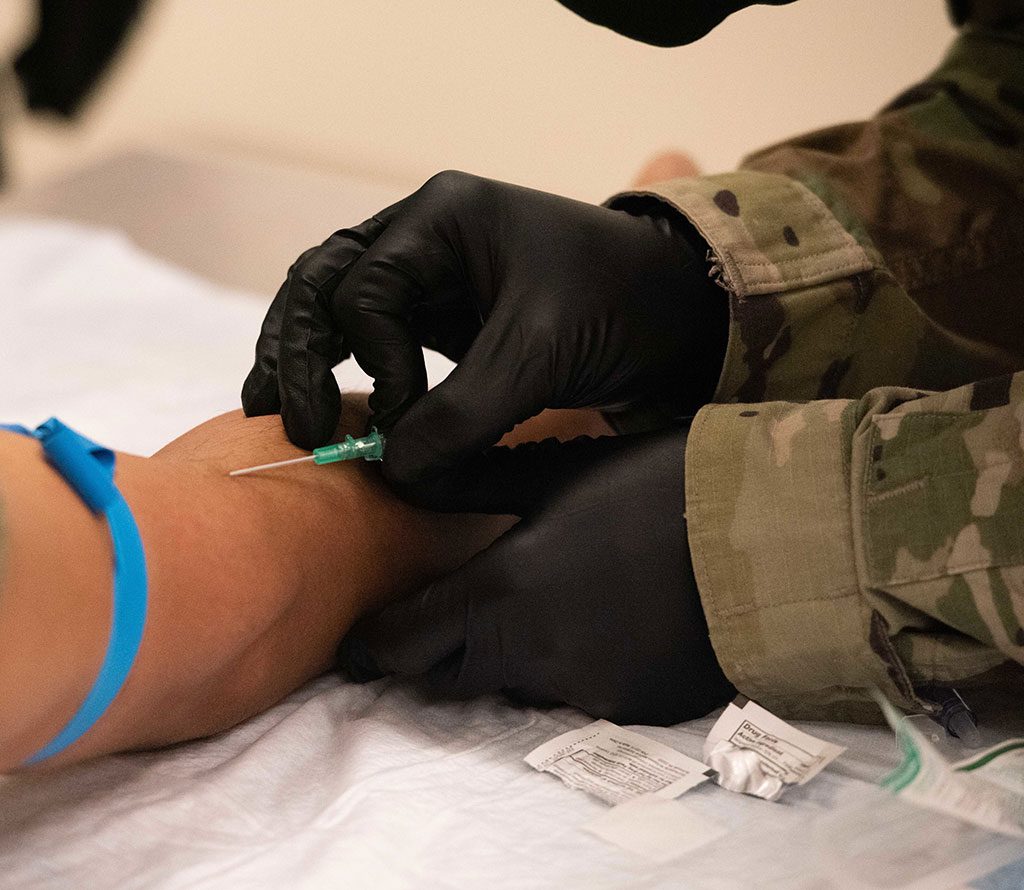Health care systems in southern Utah have been under incredible strain since summer. Hospitals in St. George have been staff-limited since the beginning of the pandemic. Due to these personnel shortages, Utah’s Department of Health requested support through the Federal Emergency Management Agency, which then requested support from the Department of Defense to provide help.
Help for medical practitioners combatting the coronavirus in Utah arrived Tuesday, Nov. 2, as Department of Defense service members arrived in St. George to assist the Utah Department of Health in administering monoclonal antibody infusions in the Southern region of the “Beehive” state.
The department, known to many as the nation’s first line of defense for military operations, is typically the last resort called on to support communities suffering from natural disasters.
“The Department of Defense has come to operate this site down here in St. George,” said Brett Cross, the State of Utah Department of Health’s director of specialty systems of care and education. “They are here to help us execute this mission. Fortunately, they have healthcare staff and qualified registered nurses that can come in and assist with this.”
The U.S. Air Force monoclonal antibody infusion team deployed to Utah is comprised of 15 Airmen scheduled to provide support at the site for a month as part of the lifesaving mission.
“We are very grateful for this opportunity,and this is something the military does very often when we’re fighting crises, whether they’re here or abroad,” said U.S. Air Force Maj. Laura Ivy-Glines, the officer in charge of the St. George monoclonal antibody infusion team.
“I will be leading a team of one doctor, two nurse practitioners, as well as four to five nurses, including myself, and several medical technicians,” said Ivey-Glines.
Although it may be a newly introduced form of COVID treatment to some, according to Cross, the Department of Health has been doing the monoclonal antibody projects since November of 2020.
Monoclonal antibody therapy is a specialized treatment employed by the Department of Health and approved by the Food and Drug Administration to help prevent the spread of coronavirus to more of an infected patient’s cells.
“We opened our first fixed site in Murray, this is our second fixed site [in Saint George],” said Cross.
This medical facility in St. George opened Nov. 4, 2021, and is open for patients to come and receive this treatment, assuming they’ve passed the required qualifications.
“To qualify for this treatment, the citizens of Utah need to be COVID positive, then go to coronavirus.utah.gov to fill out a risk tool. It’s a risk assessment calculator that determines if they’re eligible based on other healthcare conditions that they might have,” said Cross.
The risk assessment can be found on the website by clicking on a tab to the far right titled ‘Monoclonal Antibody Therapy’.
“If they’re deemed eligible, they’ll be given a list of places that they can receive this infusion,” said Cross.
Before the two dedicated sites opened, the citizens of Utah had only two options to receive this treatment. The first was to go to an infusion clinic, which is also seeing other patients for chemotherapy and various other health conditions.
The second way is through the emergency department, but because of the nature of this treatment and the extensive time it takes to administer it, this option would cost the hospitals valuable time and space in their facilities.
“There’s limited availability across the state, especially here in the St. George area. If we can free up that ER bed, free up those two hours, and that patient can come over here and get the infusion, we’re helping [the hospitals] see that next patient that’s sitting in the waiting room of the ER,” said Cross.
The treatment roughly takes two hours from start to finish. The patients begin with registering their information into an electronic medical record system. After the information is recorded into the system, they are able to start the infusion. The infusion runs for approximately 20 minutes, but the patient must stay for an additional hour for observations.
“We just want to do what’s right, and to do what’s best for the citizens of Utah,” said Cross.
To check if you or a loved one who is COVID positive qualifies for this treatment (Utah residents only), please visit www.coronavirus.utah.gov
Low Vaccination Rates in Southern Utah
Relatively low vaccination rates have kept rolling high case rates of COVID-19 crushing hospital systems throughout most of Utah since summer. Crisis standards of care and exceeded bed capacity at regional hospitals have been the norm rather than the exception. Residents are encouraged to become fully vaccinated as soon as possible.
In addition, the governor announced last week that all Utahns 18 or older can now receive a booster shot of the COVID-19 vaccines.
Current vaccination rates in Southern Utah: 113,776 (43.5% fully vaccinated)
St. George: 46.9% fully vaccinated
Cedar City: 39.03%
Washington City: 42.54%
Ivins/Santa Clara: 50.27%
Hurricane/LaVerkin: 37.3%
Enterprise/Veyo/Springdale/Hildale: 43.24%
Beaver/Garfield/Kane counties: 42.75% (+0.49%)
Story adapted from Richard Barnes, DoD and Utah Department of Health



